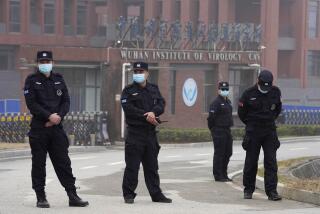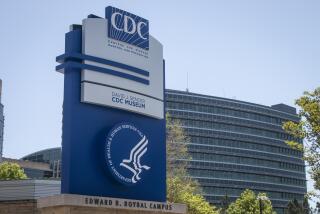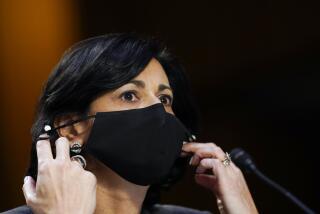American Scientist May Have SARS
- Share via
An American team helping to investigate the SARS outbreak in Taiwan was flying home to Atlanta on Thursday after one member developed symptoms that may indicate he has contracted the disease.
Although the unidentified epidemiologist from the Centers for Disease Control and Prevention has not been confirmed to have the disease, the center is bringing him home by air ambulance just to be safe, said Dr. Julie Gerberding in a telephone news conference.
The scientist did not treat any patients while in Taiwan and always wore protective garb, said Gerberding, the CDC director. But he could have been exposed through his normal daily activities.
Because the other members of the team were in close contact with him over the last few days, they are being brought home as well and will most likely be quarantined.
Meanwhile, the hotel where the group stayed in Taipei was temporarily closed for cleaning and hotel employees who came into contact with the CDC researcher have been quarantined.
Gerberding noted that the team’s scheduled time in Taiwan was almost up anyway, and it will be replaced with another group of researchers.
The situation in Taiwan continues to be grim. According to the World Health Organization, or WHO, the island reported 60 new probable cases of severe acute respiratory syndrome Thursday and eight deaths, bringing the totals to 483 cases and 60 deaths.
But the sharp jump in cases observed in recent days does not necessarily suggest an “explosive escalation,” the agency said. Rather, it is due to “a backlog in the investigation of pending cases and determination of which fit the case definition for probable SARS.”
Speaking after the World Heath Congress in Geneva, Dr. Chen Chien-jen, director general of Taiwan’s Health Department, said the island hopes to have the epidemic contained by early June.
Also in Geneva, the new director general of WHO, Dr. Jong-Wook Lee, said the organization hopes to raise $200 million in corporate donations to help fight the outbreak in Asia, as well as to prepare for future epidemics.
“The money will be disbursed rapidly, to get it to the areas that need it most as quickly as possible,” said Dr. David Heymann, who heads WHO’s communicable diseases program.
China reported 26 new SARS cases and four deaths Thursday. Authorities are confident that they are bringing the outbreak under control and allowed thousands of students in Beijing to return to school. The city closed its schools April 24, sending 1.7 million students home. Most of those who were allowed to return Thursday are seniors studying for their college entrance exams.
Scientifically, SARS researchers received some bad news Thursday from Heymann, who reported WHO’s finding that the coronavirus that causes SARS is not losing any potency as it passes through human populations. WHO researchers estimate that the virus has gone through chains of as many as 15 people without losing any virulence, a disappointment to researchers who had hoped it would mutate to a more benign form.
Heymann noted that the human monkeypox virus, for example, is only able to pass through one or two generations of human victims before losing its ability to infect others.
On the lighter side, astrobiologist Chandra Wickramasinghe of the Cardiff Center for Astrobiology speculated in a letter in the Lancet, an international medical journal, that the coronavirus that causes SARS may have been seeded on Earth by comets.
Gerberding dismissed his speculation. “We have explanations that are far more plausible than meteorites,” she said.
More to Read
Sign up for Essential California
The most important California stories and recommendations in your inbox every morning.
You may occasionally receive promotional content from the Los Angeles Times.













